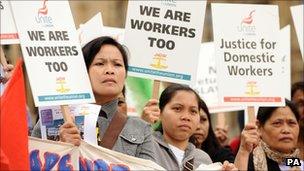It’s Women’s Month in South Africa, and the news from government is predictably grim. Women are still suffering, announced Minister for Women, Children and People with Disabilities Lulama Xingwana, and in particular for `rural women’. This comes a year almost to the day of the Human Rights Watch report, Ripe with Abuse Human Rights Conditions in South Africa’s Fruit and Wine Industries. The report described and documented the face of the abused farm worker in the Western Cape, and, to no one’s great surprise, the face is a woman’s.
A year later, the struggle continues.
For example, Worldwatch Institute issued a report this week that finds that investment in women farmers, globally, is too low. Remember, women produce half of the agricultural output in South Asia and 80 percent in sub-Saharan Africa. Further, women farmers produce more than half of all food and comprise 43 percent of the global agricultural labor force. `Forgetting’ women endangers food security as it threatens food sovereignty. Beyond that, and perhaps more to the point, excluding women farmers and farm workers imperils democracy, locally, nationally, regionally, globally. Remember that the next time you bite into a piece of fruit, wherever you are.
While the situation is grim, the news is not all bad. In the United States, undergraduate women enrolled in agriculture programs outnumber undergraduate men by more than 2,900 students. That’s out of a sum of around 50,000 students. This trend corresponds with the increase in women farm operators.
In Sierra Leone, Nigeria, Senegal, the Philippines, Nepal, and beyond and between, women farmers, women farm workers, rural women activists and organizers, ordinary rural women, are breaking new ground … literally. They are moving from a field not quite her own to a field of her own. And that’s good news … for food security, for food sovereignty, for democracy. The struggle continues.
(Photo Credit: Phuong Tran/IRIN)


